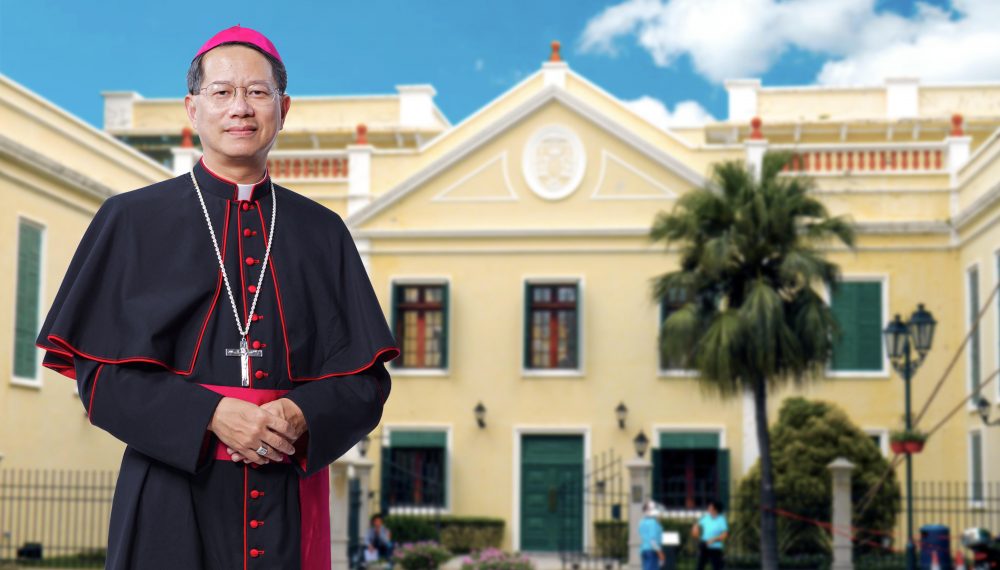O Clarim News Desk (English)
Dear brothers and sisters in Christ,
Alleluia!
The risen Lord Jesus Christ has destroyed sin, suffering and death. He is the Master of life who has freed mankind from death. He has accomplished the work of salvation that shows God’s power and grace.
The global epidemic still rages and has not yet completely subsided. As the world commemorates the death and glorious resurrection of Jesus Christ at this challenging turning point, let us also take this moment to reflect on the meaning of the precious life that God has given us, in our own journey.
The protracted battle between our society and the coronavirus has been going on for more than two years. The uncertainty of the future has gradually exacerbated the sense of powerlessness among communities and peoples. In a recent meeting with social workers, I sensed their uneasiness about the future and the livelihood of those at the grassroots. The Catholic Church is, therefore, strengthening its social services and psychological counseling to meet the potential increase in demand.
Our society needs to be healed, to make peace with our world, to make peace with our neighbors and to make peace with each other in the way that the Risen Lord taught us. Pope Francis reminded us, in his Wednesday audience, that in the Christian tradition, the virtues of faith, hope and love are not merely emotions or attitudes, but virtues poured out on us by the grace of the Holy Spirit (1): graces that heal us, that make us healers, that open us to new horizons, even as we go through the turbulence of our times (2).
Faith teaches us to uphold the dignity of man and to care for those who are marginalized in times of epidemic, to help those afflicted maintain their dignity so that they are not treated as objects to be discarded casually. Objectification can blind us, promote individualism and a radical “throw-away culture”, and reduce people to mere consumer goods (3).
Hope teaches us not to give up on the future, especially in the pursuit of the Kingdom of God, even in times of uncertainty and extreme suffering. Wearing masks in public places is a civic duty for public health. But the challenge is not to allow the “isolation” for the sake of public health to evolve into the “alienation” of human beings. The Pope has repeatedly stressed: “We forget that, being created in the image and likeness of God, we are social, creative and solidary beings with an immense capacity to love. We often forget this. In fact, from among all the species, we are the beings who are the most cooperative and we flourish in community, as is seen well in the experience of the saints.” (4)
Love asks us to give priority to caring for the poor, for those who suffer from social injustice, inequality of opportunity, marginalization and lack of protection for the vulnerable (5). These include those who are unemployed or fear losing their jobs; the workers who are forced to find jobs in different countries or places because of the epidemic; entrepreneurs who fear unemployment and the loss of their business dealings… All of them are struggling to survive. Love teaches us not to forget the gentleness that we must have as Catholics. For “Tenderness is the very sign of Jesus’ presence. Approaching others in order to walk [together], to heal, to help, to sacrifice oneself for others.” (6)
I invite you to continue to pray, relying especially on the prayers of Our Lady of Immaculate Conception, for peace and harmony, for the refugees suffering in the recent war between Russia and Ukraine, for the cessation of hostilities, for harmony in the international community and peace between the two countries. The vision of the Kingdom of God is:
“That bread may reach everyone, that social organization be based on contributing, sharing and distributing, with tenderness; not on possessing, excluding and accumulating. Because at the end of life, we will not take anything with us into the other life!” (7) We cannot pay attention only to our own virtue without thinking about others – the soul is the object of core value that we need to fight for. Just as Jesus said in the parable of the Lost Son, “But now we must celebrate and rejoice because your brother was dead and has come to life again; he was lost and has been found!” (8) True conversion of the heart is the true beginning of the path of reconciliation for all of us, the whole Universal Church, together with all the people of this world.
† Most Rev Stephen Lee Bun Sang
Catholic Diocese of Macau
Reference:
1. Catechism of the Catholic Church, 1812, 1813
2. General Audience of Pope Francis on Wednesday, August 5, 2020
3. Apostolic Exhortation “The Joy of the Gospel”, 53; Encyclical “Laudato si’”, 22
4. General Audience of Pope Francis on Wednesday, August 26, 2020
5. Ibid, August 19, 2020
6. ibid, September 30, 2020
7. ibid, September 30, 2020
8. Luke 15:32


 Follow
Follow


